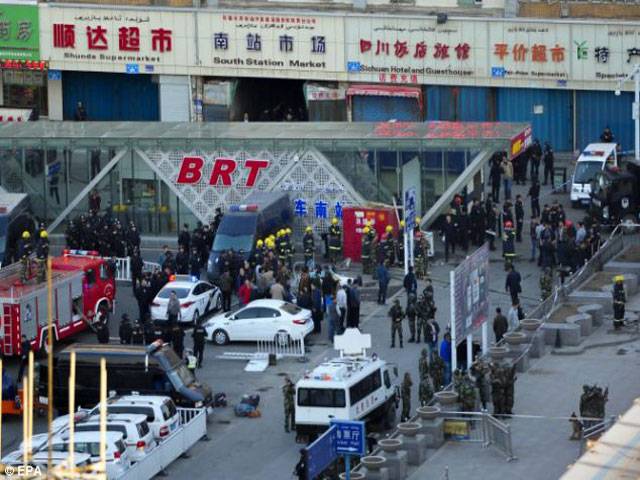BEIJING - Three people were killed and 79 others injured in an attack on a railway station in China’s Xinjiang region late Wednesday, state media said.
China’s official news agency Xinhua said attackers slashed people with knives and set off explosives at the south railway station in Xinjiang’s capital Urumqi, calling it called a “violent terrorist attack”.
The attack came on the same day that President Xi Jinping ended a visit to the restive region in China’s far west that is home to the country’s mostly Muslim Uighur minority. Four people were seriously injured but were “in a stable condition” after being sent to hospital for treatment, Xinhua reported, citing local Communist Party officials.
The blast came just as President Xi Jinping was wrapping up a four-day visit to the region. It was not clear if he was still in Xinjiang at the time.
Pictures on China’s Twitter-like Weibo service, which Reuters could not independently verify, showed blood on suitcases and debris on the ground in front of the station.
Another picture showed what appeared to be a small blast area near a police post, though it was unclear if there were any casualties in the photograph. Calls to the Xinjiang government seeking comment were not answered. “Police are evacuating people in surrounding areas,” Xinhua said. “Police have cordoned off all entrances to the square of the station. Armed police have been deployed in the square.”
“The long-term stability of Xinjiang is vital to the whole country’s reform, development and stability; to the country’s unity, ethnic harmony and national security as well as to the great revival of the Chinese nation,” Xinhua quoted Xi as saying during his visit. Xinjiang, resource-rich and strategically located on the borders of central Asia, has been beset by violence for years, blamed by the government on militants and separatists. Exiles and many rights groups say the real cause of the unrest is China’s heavy-handed policies, including curbs on Islam and the culture and language of the Muslim Uighur people who call Xinjiang home.
China’s nervousness about militancy has grown since a car burst into flames on the edge of Beijing’s Tiananmen Square in October, and 29 people were stabbed to death last month in the southwestern city of Kunming.
Unrest in Xinjiang has led to the deaths of more than 100 people in the past year, prompting a tougher stance against Uighurs, many of whom chafe at Chinese controls on their culture and religion.
Saturday, April 20, 2024
3 die in attack on station in China’s Xinjiang

Caption: 3 die in attack on station in China’s Xinjiang
8:27 AM | April 19, 2024
8:09 AM | April 19, 2024
Pak economy improving, funds will be provided on request: IMF
9:57 PM | April 19, 2024
Minister advocates for IT growth with public-private collaboration
9:57 PM | April 19, 2024
Judges' letter: IHC seeks suggestions from all judges
9:55 PM | April 19, 2024
Formula 1 returns to China for Round 5
9:05 PM | April 19, 2024
Germany head coach Julian Nagelsmann extends contract till 2026 World Cup
9:00 PM | April 19, 2024
A Tense Neighbourhood
April 19, 2024
Dubai Underwater
April 19, 2024
X Debate Continues
April 19, 2024
Hepatitis Challenge
April 18, 2024
IMF Predictions
April 18, 2024
Kite tragedy
April 19, 2024
Discipline dilemma
April 19, 2024
Urgent plea
April 19, 2024
Justice denied
April 18, 2024
AI dilemmas unveiled
April 18, 2024
ePaper - Nawaiwaqt
Advertisement
Nawaiwaqt Group | Copyright © 2024





